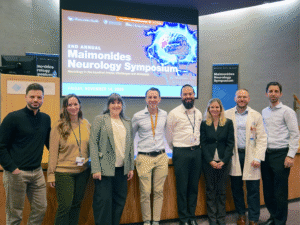International trips can be exciting adventures. Planning usually involves mapping out activities and picking out what clothes to pack. But taking health precautions is also critical for a safe, enjoyable trip. And the Maimonides Travel Medicine Clinic is here to make it as easy as possible for patients to protect their health while abroad.
As the only family travel medicine clinic in Brooklyn, Maimonides offers the comprehensive medical services and advice travelers need to avoid health hazards. This service is particularly valuable because many area residents travel abroad frequently.
“Our community is diverse, and they travel a lot. Many of them go to countries where health-related travel requirements exist,” says Rabia Agha, MD, Director of Pediatric Infectious Diseases at Maimonides. “Not every center can provide the services and documentation many travelers need. At Maimonides, we do.”
The Importance of Travel Medicine
Travel medicine is important because health-related risks exist in every country. Based on the patient’s destination, infectious disease providers can deliver necessary vaccines or prescribe prophylactic medications to ward off multiple diseases like typhoid and malaria. Providers also tailor their health-related advice and guidance around the patient’s travel plans. For example, they can offer information about current outbreaks or endemic infections.
“Most people do not realize there are potential health dangers associated with travel and that they need to take steps to protect themselves from common and uncommon risks,” says Monica Ghitan, MD, Associate Director of Infectious Diseases at Maimonides. “Visiting the Travel Medicine Clinic before a trip is important because living conditions and quality of food and water in other countries may differ greatly from the United States.”
Scheduling a visit with a travel medicine specialist is equally important for patients from other countries who now live in the United States, she says. Once they leave their country of origin, they can lose their immunity to certain infections within six months of moving away. So, they also need to take extra precautions before traveling.
A One-Stop Visit for Patients and Families
Maimonides offers two travel clinics — one dedicated to adults and one focused on families with children. Patients can schedule appointments themselves or a primary care provider may refer them. During these 45-minute visits, patients meet with infectious disease doctors to receive health services and travel advice specific to their travel plans.
“We tailor every visit to the people who are traveling,” Dr. Agha says. “We consider where they are going, what underlying problems they have, what medications they take, and whether they have any chronic conditions that would require special consideration.”
As an authorized, licensed site for official international vaccinations, Maimonides administers and provides required documentation for multiple vaccines, including tetanus toxoid, hepatitis A, measles, typhoid, and yellow fever. Providers also write prescriptions for anti-diarrheal medications.
Dr. Ghitan recommends patients schedule their appointment at least two weeks before their travel date. Planning that far in advance allows enough time for vaccine protection to begin. Patients who need two-dose vaccines should schedule visits roughly a month in advance.
The remainder of the visit is dedicated to educating patients about current and ongoing health-related problems in their travel destination, Dr. Agha says.
“There are many preventive steps to discuss with patients so they’re confident they know how to protect themselves,” she says. “It’s all about helping them understand why and how to take the necessary precautions.”
For example, providers teach patients to apply sunscreen before insect repellant. They can also explain the proper way to use mosquito netting, if needed.
Spreading the Word About Travel Medicine
Protecting patient health during international travel is a matter of public health, Dr. Agha says. So, it’s important that primary care providers and pediatricians know that Travel Medicine Clinics exist.
“Even though these services are a necessary resource, many people still don’t know that Family and Adult Travel Clinics are here,” she says. “We must collaborate with primary care doctors who can refer their patients who plan to travel abroad.”
Recommendations for Safe Travel
Travel advice and requirements are different for every patient because their health and destinations are unique. However, there are a few common health risks and recommendations that every traveler should know about.
According to Dr. Ghitan, travelers should take precautions against these health hazards:
- Chikungunya
- Dengue virus
- Malaria
- Other mosquito-borne illnesses
- Tick-borne viruses
- Traveler’s diarrhea
- Yellow fever
- Zika virus
In addition to vaccinations, travelers should follow these tips to avoid health problems:
- Apply insect repellant (must contain 20% DEET)
- Avoid street vendor food
- Avoid ice
- Choose drinks (alcoholic and non-alcoholic) in sealed containers
- Don’t eat fresh salads
- Don’t touch or pet stray animals (rabies is common in many countries)
- Only eat fruit with skin that can be removed
- Use sunscreen
- Wear shoes instead of walking barefoot
If patients receive the required vaccinations and follow country-specific guidance, they will be well-equipped to protect their health during travel, Dr. Agha says.
“Everyone needs to be aware of all the possible risks. Our goal in the Travel Clinic is to help protect our patients in every way we can,” she says. “The ultimate aim is to ensure our patients are well prepared before they leave so they can have a happy, healthy travel experience.”
Learn more about travel medicine for adults and for families with children. Call (718) 283-8578 to make an appointment or refer a patient.




